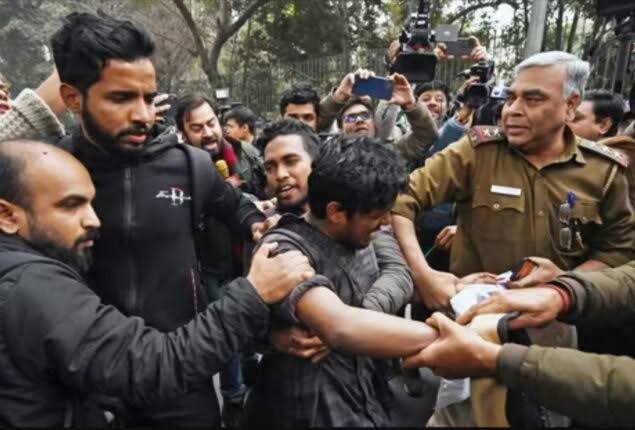In response to the broadcast of a BBC documentary about Prime Minister Narendra Modi’s suspected involvement in the deadly Gujarat sectarian riots in 2002, police in the Indian city of New Delhi have detained numerous students.
After student organizations affiliated with Modi’s Bharatiya Janata Party (BJP) protested the screening, police descended on Delhi University, confiscating laptops and forbidding gatherings of more than four persons.
24 students were held, according to police officer Sagar Singh Kalsi, who spoke with the Indian news outlet NDTV.
The federal government utilized its emergency powers earlier this week to prevent the documentary’s airing and forbid its dissemination on social media. Many links to the documentary were removed by Twitter and YouTube after they responded with the request.
Students gathered to view the documentary on laptops and phones at Delhi University and on multiple other campuses throughout India, ignoring official attempts to halt the film’s transmission.
According to the two-part documentary, Modi instructed police to ignore deadly riots while he was Gujarat state’s chief minister.
The unrest started after a train fire claimed the lives of 59 Hindu pilgrims. In connection with that incident, 31 Muslims were found guilty of murder and criminal conspiracy.
In the ensuing rioting, about 2,000 people, predominantly Muslims, were slain.
The violence was “politically driven,” according to a report from the British foreign ministry that was previously classified, and its goal was “to cleanse Muslims from Hindu areas,” according to the documentary.
The report asserts that Modi’s administration’s “environment of impunity” is what made the riots possible.
A number of campuses around the nation have hosted broadcasts by rebellious students.
On Wednesday, tensions over the matter erupted in New Delhi, where a student group at the Jamia Millia Islamia university announced that it intended to screen the documentary that had been outlawed. As a result, numerous police officers clad in riot gear and tear gas gathered outside the campus gates.
At least half a dozen protesting students were detained by police, some of whom were wearing plain clothes.
Prior to the video being shown by a students’ organization on Tuesday, the Jawaharlal Nehru University administration in the city turned down power and internet access on the campus.
Authorities warned that it would cause trouble on campus, but despite their warnings, students watched the documentary on their laptops and smartphones after distributing it on Telegram and WhatsApp.
An investigation was started at the southern Indian university of Hyderabad after a student organization aired the outlawed video earlier this week.
Workers for the BJP staged protests in the southern state of Kerala when some student organizations connected to other political parties disobeyed the ban and showed the movie.
From 2001 until his election as prime minister in 2014, Modi served as governor of Gujarat. Due to the violence in 2002, the US briefly imposed a travel ban on him.
In 2012, a team of investigators tasked by the Indian Supreme Court with looking into Modi’s and others’ involvement in the riots reported that they had not discovered any evidence to bring charges against him.
The government’s decision to outlaw the documentary sparked a storm of protest from rights organizations and opposition parties, who denounced it as an assault on journalistic freedom. Additionally, it increased awareness of the documentary by encouraging a large number of social media users to share segments on Twitter, Telegram, and WhatsApp.
In recent years, press freedom in India has deteriorated. In the Press Freedom Index issued by Reporters Without Borders last year, the nation dropped eight spots to rank 150 out of 180 nations. It charges that the Modi administration silences online criticism, especially on Twitter.
Human Rights Watch claimed that the documentary’s prohibition is part of a larger campaign against minorities being carried out by the Modi administration, which the rights organization claimed often uses harsh legislation to stifle dissent.
“The truth is the truth. You can outlaw things, stifle the press, and control institutions. Rahul Gandhi, the leader of the opposition Congress party, told reporters, “It has a nasty habit of coming out.”





